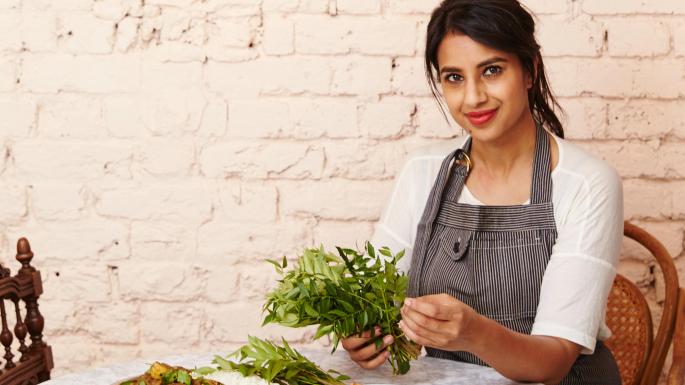
Ravinder Bhogal is a woman of many talents. A former beauty journalist, she gained prominence as a cook when she was crowned the new Fanny Cradock by Gordon Ramsay on his show The F Word. Since then, she has published her debut cookbook, Cook in Boots, presented multiple BBC TV programmes in the UK and India, written countless articles on food and culture and opened her first restaurant, Jikoni, in Marylebone, in September 2016. Over a cup of chai, I chatted to Ravinder about cooking for one of her idols, politics, coping with pressure, Marco Pierre White’s recent comment about women in the kitchen and more.
“The best gift that you can give to someone is your time.”
You’re a food writer, chef, TV presenter, journalist, cook and restaurateur. Which one of these is your favourite hat to wear and why?
I consider myself first and foremost a writer and then a cook. I don’t even like to use the word ‘chef’ because I feel like I’m a cook. I cook because I want to feed and that’s how I’ve grown up learning about food. I think if you like to cook, it’s because you like to feed people.
When AA Gill reviewed Jikoni, he was able to elocute things about us that we hadn’t even been able to say. When I read the review, the thing that really gripped me was that he’d seen that I was a cook. He’d said something about there being people that you can’t trust in life, but you can always trust a cook because our intentions are very pure.
I love the poetry of food and being able to combine flavours, diverse backgrounds and ideas. For me, it’s not just about the dishes, it’s about the conversations around them as well. I also adore service now, but I was terrified of it at the beginning! I love the buzz, meeting people and hearing their stories. On a good night, Jikoni feels like one big dinner party and it’s a lovely experience. What I really enjoy is the art of hospitality: it’s a real privilege to have the opportunity to transform someone’s day with a plate of food. Part of being a cook is that you’re also very intuitive to people and their needs.
Madhur Jaffrey, one of your long-time role models, recently dined at Jikoni. How did it feel to finally meet her and what did she make of your menu?
I can’t tell you how it feels to meet someone who inspired what you do. I grew up with very strong role models on TV like her, Nigella Lawson and Delia Smith who made it very real to me that this could be a career option, that you could cook in a non-subservient way and make a living. I watched this cult of domesticity with my mother, grandmother, aunts and sisters all nodding along, cooking for their husbands and children and was told that I’d do the same. I was never told that I could do this as a career, otherwise I might have done it 15 years ago! So, it was women like Madhur who subconsciously influenced me because they were so fantastic at what they did.
It was such an absolute honour to meet her, and you never have the language to tell someone in that moment what they’ve meant to you without gushing. She’s exceptional, and not just as an author or chef. She’s very interesting, tough, funny, beautiful… My heart has never beaten so fast. When I gave her a hug, I was sure that she could feel my heart pounding!
She came in for breakfast on a weekday and said, “I don’t like to eat out a lot; I like home cooking,” and I think she got us because it felt like home cooking. She really enjoyed it. My husband kept her company while she waited to be picked up and he said, “There’s no impressing an 85-year-old who has seen it and done it all before you!” She’s a powerful, inspiring woman.
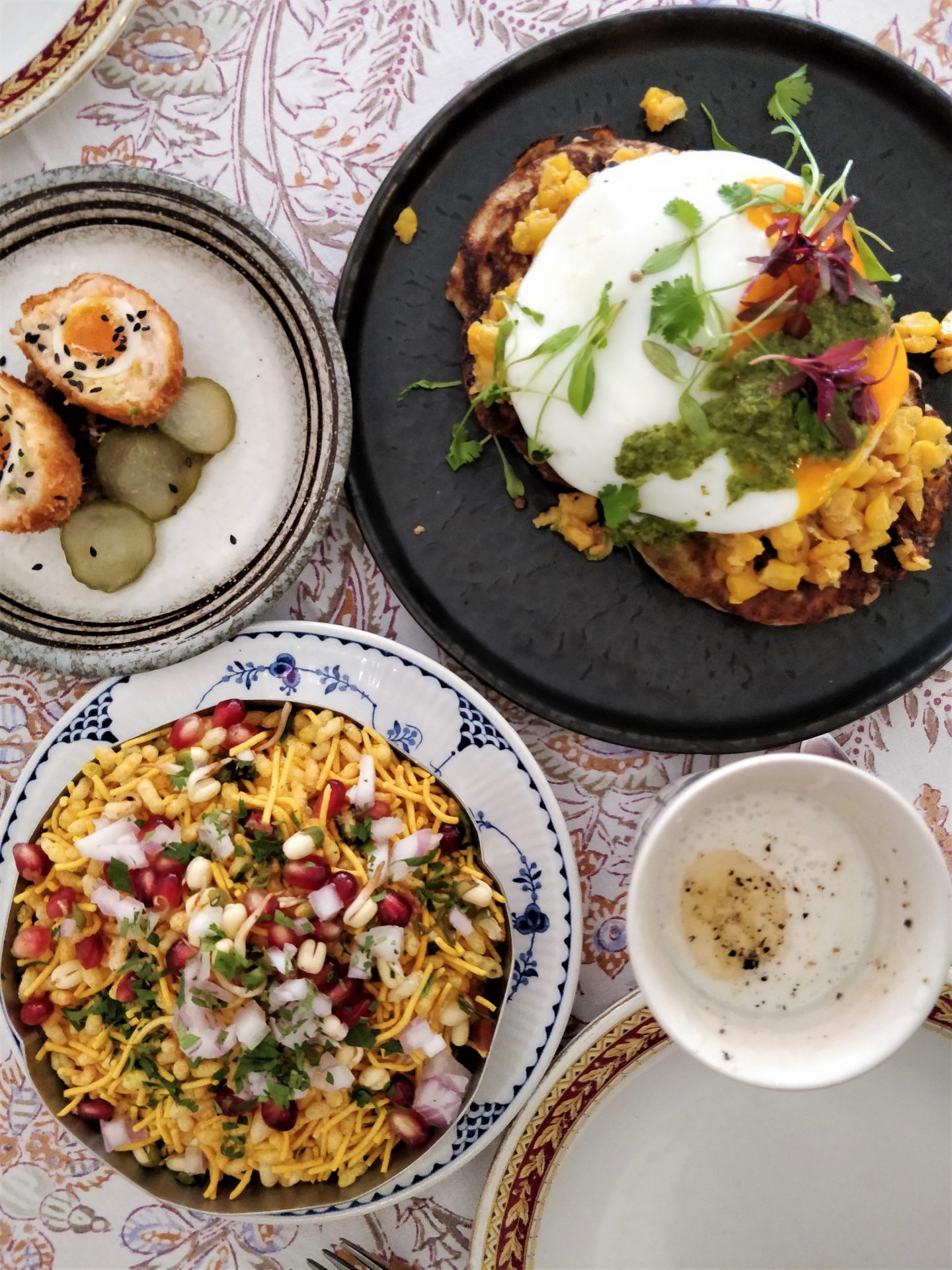
Brunch at Jikoni 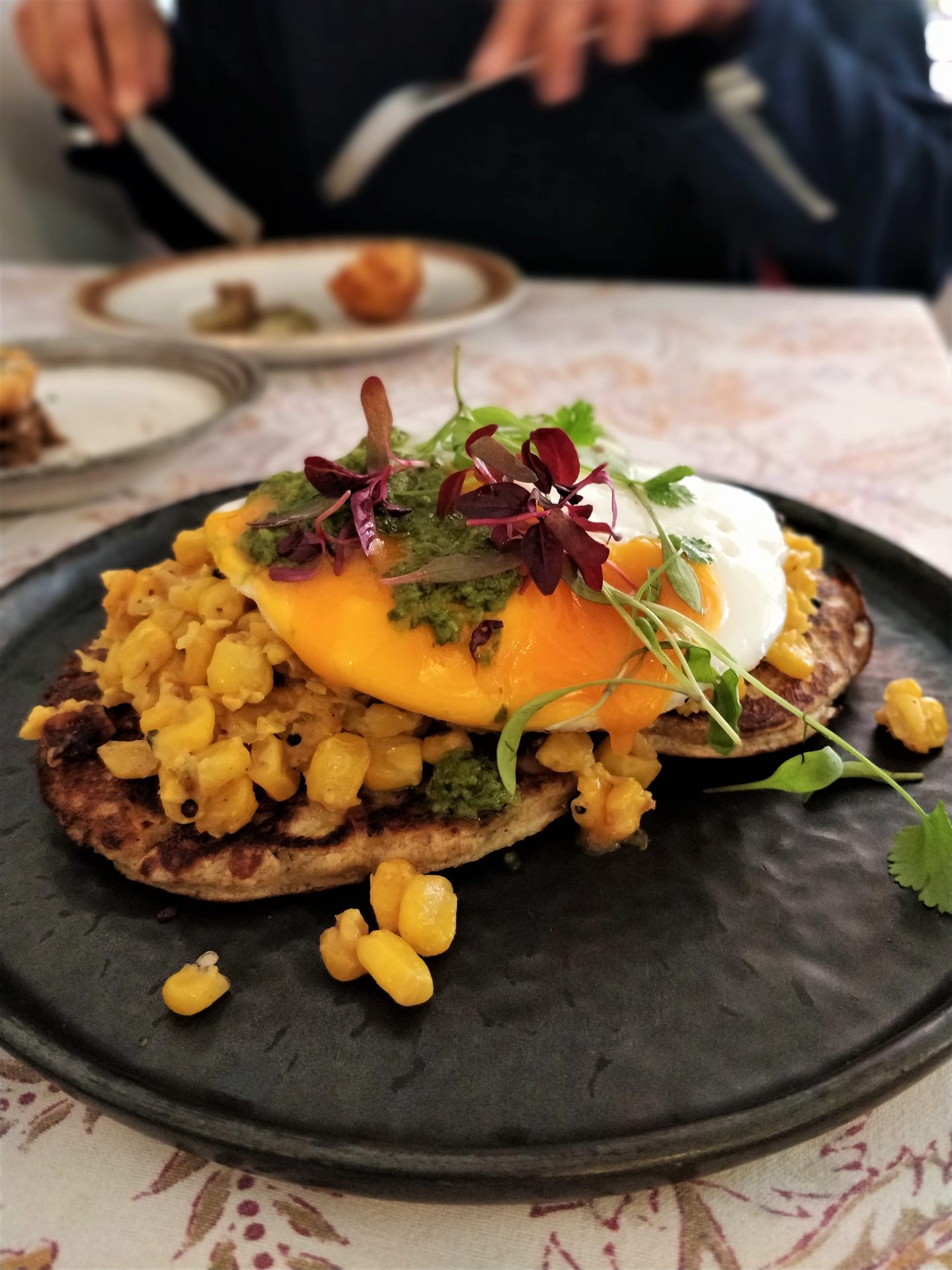
Sweetcorn Pancakes
You’ve previously said that the word ‘concept’ makes you cringe. What’s the reason behind that, and are there any other words which have a similar effect on you and why?
When we opened, I was constantly asked about the “concept”, but there was no concept; I’m not a Noma-esque chef who’s doing lacto-fermentation or anything extreme. I’m just cooking the food that I’d cook for my family and friends to make them have a good time and that’s all I’ve ever wanted to do in my restaurant. I’m not trying to show off. I’m cooking to please myself as well: I’m very greedy and I like to eat! If a dish makes me happy, then I know it’ll make someone else happy, too.
I remember cringing when we went to a restaurant in Girona set up by an ex-el Bulli chef and instead of greeting us, the first thing the waiter said was, “Let me tell you about the concept.” I just wanted to eat some delicious food. We left after two courses because it was so in your face; you just want to unwind and have a good time.
There’s nothing wrong with a concept if there is one, but often I find that people are just hopping onto trends. I just don’t think it’s necessary if you’re confident in what you do; you don’t need to spell it out. I want less tell, more show, please.
You’ve often spoken about the intense flavours and textures of Kenyan produce. What are your favourite British ingredients and how do you love to prepare them?
We have so many lovely ingredients, not just British, but also European ones, like Tarocco oranges. We also source courgette flowers from Italy, which over summer we stuffed with Keralan crab, dipped in a light yeast batter – which has the lightness of a tempura batter, but with more ‘grip’ and so stays crisper for longer – and served with a coriander and coconut chutney.
When we came to [the UK], we were so used to the tropical climate and the ingredients we had back home, then suddenly we couldn’t get raw mangoes at a reasonable price. Over time, I learned that the sharpness of a raw mango is very similar to the sharpness of a Bramley apple. Years ago, I used to make ‘mathis’ with Bramley apple achaar, which people would mistake for mango. It gives me joy to find the similarities if you’re open to them.
I also love beetroots of all shapes and sizes – I’m obsessed! We get such lovely meat as well, such as Herdwick mutton, which we used for our Sloppy Joe’s in the early days. We try to use suppliers who have a very similar ethos to ours, and I must mention Bethnal Green Fish. They’re a small father-and-son business who’ve been going for years. I can call Serge and ask for a ridiculous thing at any hour of the day and I know that he’ll get the best quality for me. He gives great advice as well.
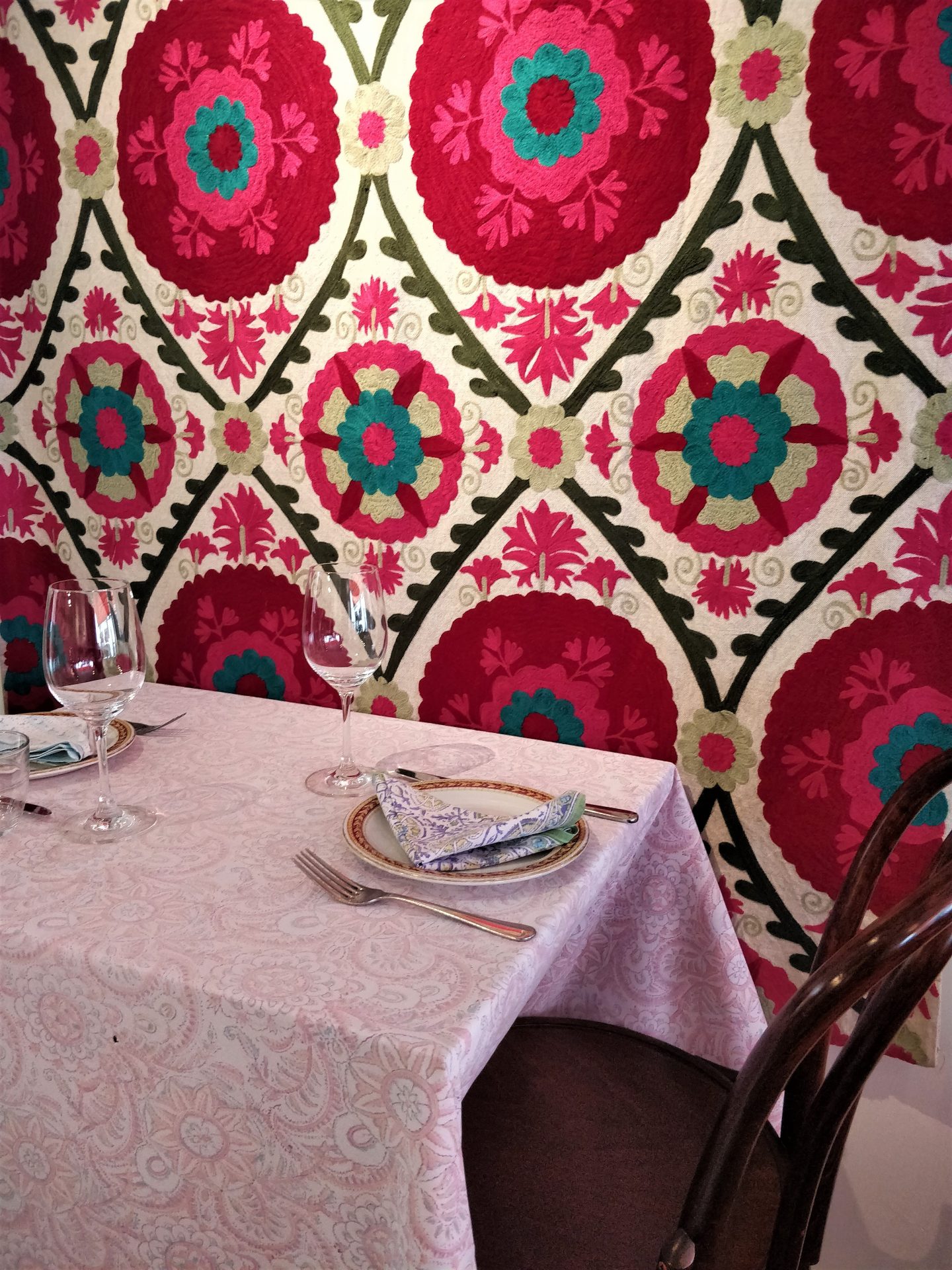
Jikoni Restaurant 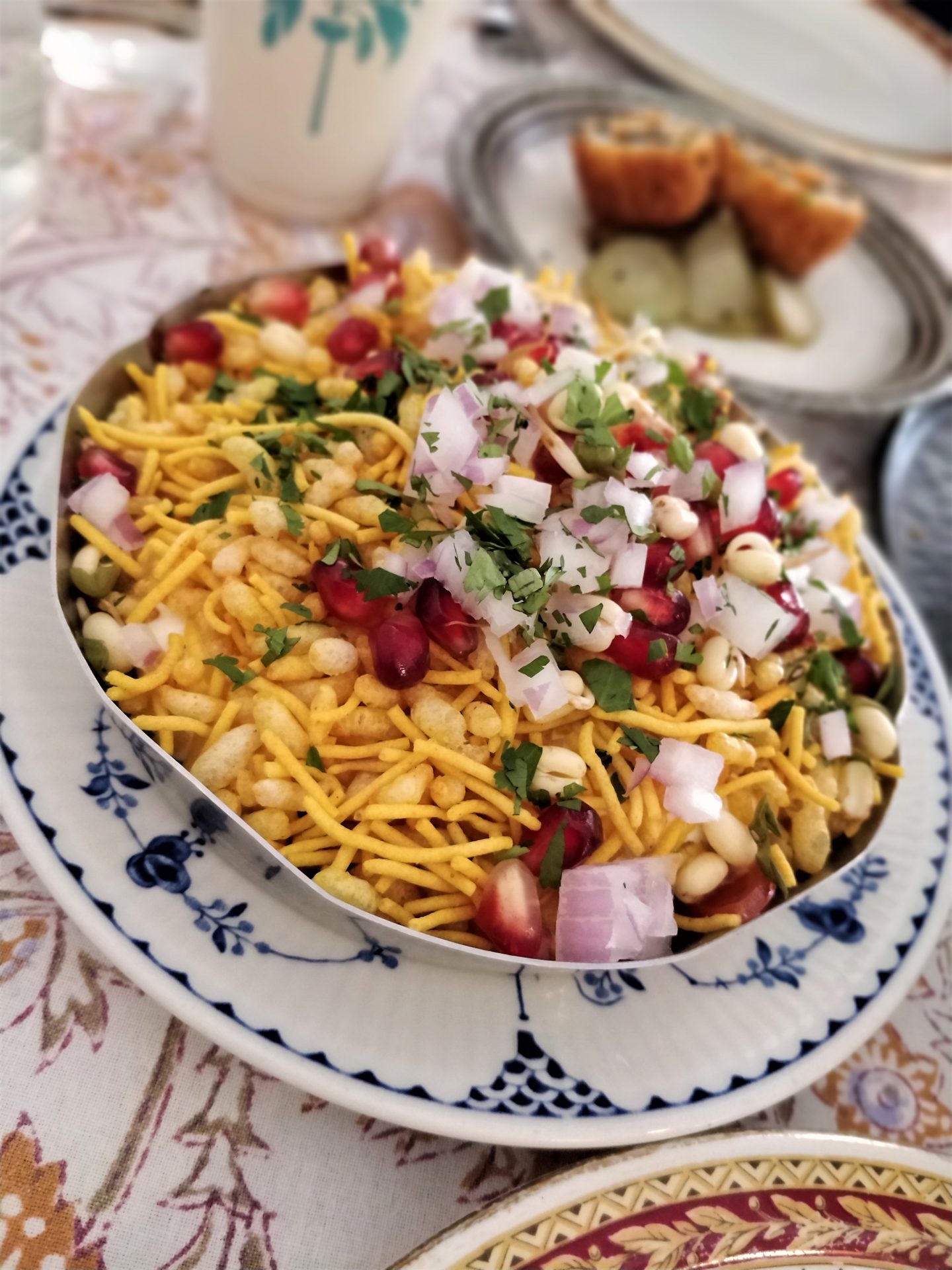
Sweet Potato Bhel
At Jikoni, you’re “making a political statement with [your] food”. How do you feel about the current political climate, both in the UK and internationally?
I’ve been reading Salman Rushdie’s new book Quichotte and he’s really bringing in what’s going on in the world. Whether you look at Trump or Modi or Boris, they’re all satirised in a way. I watch politics at home and abroad through the sieve of my hands and I feel deeply ashamed that complete nincompoops are allowed to run our countries. I feel quite strongly that it has a real effect on humanity. When you elect people who are racist, non-inclusive, not pluralistic, megalomaniacs as your leaders and who have absolutely no morals in their personal and professional lives, you’re setting a benchmark. That’s how these people come in power: it gives the world an excuse to say, “Well, if the President can pussy-grab and do these horrific things, then it’s OK for me, too.” We really have to fight to get people who believe in the running of a country and some morality.
“Entitlement is never a good quality to have in a leader.”
Entitlement is never a good quality to have in a leader. At Jikoni, we’re about pluralism and diversity, and truly believe that what makes Britain great is immigration. We do that in our hiring and the way we cook: our food is the food of immigrants, people who ache for what they left behind. When you reconcile this with their new landscape, you’re creating a new world cuisine.
Immigrant food is about adaptation: adapting to what you have available to you; your recipes being open-ended because you don’t know if you’ll be taking flight and going somewhere else; supporting the mini economies around you because when you live in immigrant communities, there are many diverse communities, so you shop at Polish or Chinese supermarkets and that informs how you cook things. When you take a dish and fuse it with something else, the sum of those elements makes something greater. We have that with our very famous Prawn Toast Scotch Egg: we call it the love child of Chinese prawn toast and a British Scotch Egg. People love it and can’t get enough of it!
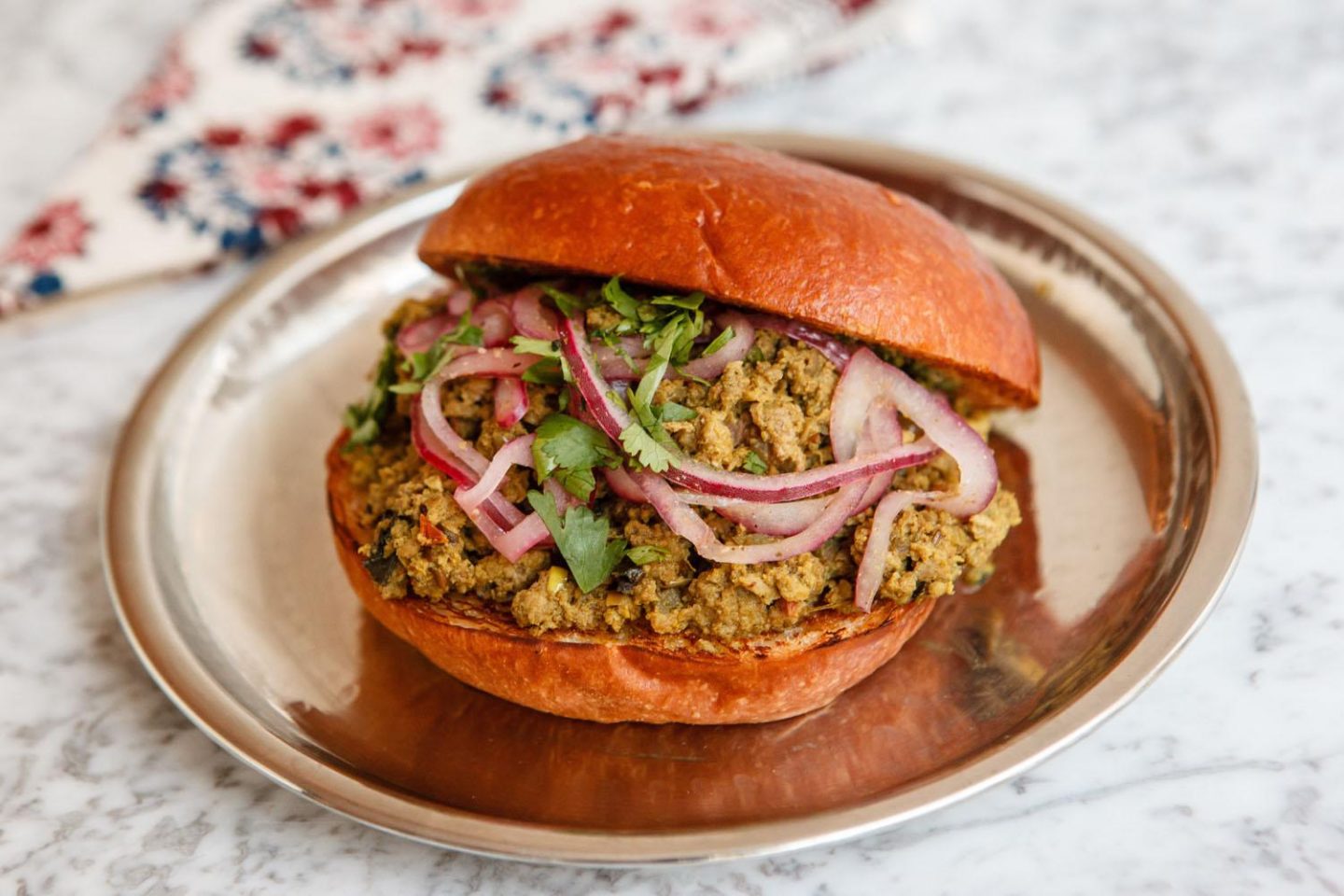
How do you cope with the various pressures of being a restaurateur, and look out for your team’s mental health, too?
For the first 1.5 years, I punished myself intensely. I was so keen and so terrified that I had to prove myself to everyone: be head chef; manage front of house; write 6,000 articles at 2am after work. I went through such anguish, both physically and mentally. At one point, I had two broken ribs and I was coughing so much that my husband insisted that I go to the hospital. As soon as they saw me, they said I needed to see a specialist. It turned out that I had whooping cough and I’d managed to break two ribs while doing 90-cover services for seven months. I realised that I needed to step back.
That said, I work every day. I don’t switch off: I’m writing a book; doing all the restaurant admin; developing new dishes; giving training; doing service. I choose the pace, though, so I’ve taken more control of it. I’ve also learned to say no, which comes with time, experience and confidence. As a freelancer, you’re so scared to decline offers, but you have to for your own mental health. I’ve learned to delegate; I was such a control freak at the start! It was a problem because I’d give someone a task and they’d be perfectly capable of doing it, but for some stupid reason to do with ego, I believed only I could do it perfectly. I had a moment of clarity in therapy when I just let go. Now I empower my team, trust them and know they have pride in their work.
“We ought to treat people with respect, like human beings.”
One thing I’m very passionate about is feeding my team well. You are what you eat, so if you’re just going to have a bowl of carbs, you won’t be at your best for work. You’ll hit a sugar high and then crash, so I’ve also been insistent that there should be some vegetables, a salad, something fresh and light, but also something comforting, all of which changes daily.
Another thing is making sure that people feel heard, which means being approachable, being very transparent with people about what’s needed, their role and their path. I don’t believe in holding people back: if they’re growing, you encourage them to do so as much as they can. You don’t own people; it’s a privilege to be part of someone’s journey and if they stay with me for 15 years, that’s amazing. But if they decide to move on, that’s absolutely fine and I’ll support them in that.
Work-life balance is important for the team – I know some Michelin-starred chefs and their teams are doing 90+ hours a week and I think it’s ruining the industry. You’ll get someone who’s very young and willing to do anything. They might do those hours for about six months, but then they burn out and we lose them. Last year, there was a crazy statistic about how many chefs dropped out of the industry. We ought to treat people with respect, like human beings. Every industry comes with its challenges, but we have to look after our people.
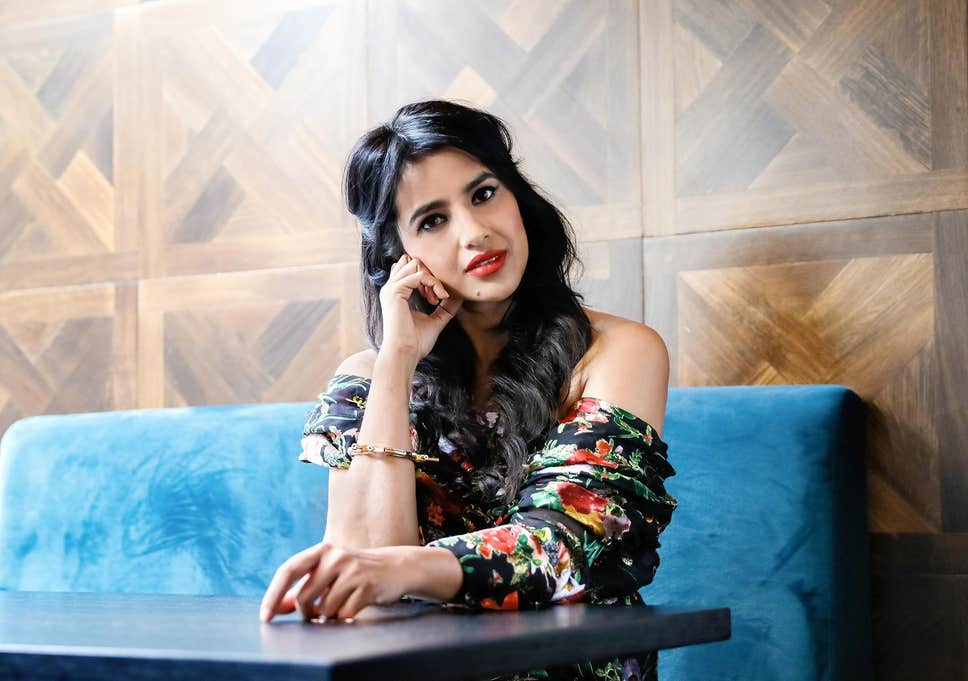
Which books have had the most impact on you and why?
My favourite author is Jean Rhys and I literally read all her books in one go! I related so intensely to her; no writer has ever moved me in the same way. I sobbed once I’d finished her books because I knew she was dead and wouldn’t write anymore. I still reread her as I find her so inspiring.
I also really enjoyed Salman Rushdie, who gave us a lovely nod in the October edition of Vogue when he called us one of his favourite restaurants. I’ve listened to the audio version of his latest book, but I’m reading it now because what you pick up when you read something as opposed to when you hear it is very different.
Tishani Doshi’s work astounds me: she’s an exciting poet whose work really bites. Her new novel, Small Days and Nights, is one of the most beautiful things I’ve read recently.
There’s also Leïla Slimani, whose books are deeply disturbing, but they’re very real and raw. She really finds the light and shade in people, which I think we all have because no-one is perfectly good or perfectly bad and she writes that so well. The last book I read was Adele, which I thought was going to be a racy romp, but it’s about a woman who’s afflicted with sex addiction.
What was your reaction to Marco Pierre White’s latest outburst that women are too emotional in the kitchen?
When people make controversial statements like that, which seemed like a PR stunt, they’re looking for attention and I don’t think we should give it to them. Those kinds of comments are so irrelevant and completely unfounded. I also feel that it comes from a place of fear; Marco is probably afraid of all the wonderful women who are taking over the industry and beating him at his own game. It’s outrageous that anyone would make a comment like that today.
I’d love to ask Marco to come [to Jikoni] and see what happens when there’s pressure in my kitchen because I certainly don’t go off and cry and file my nails, neither do any of my contemporaries. He has paid such a disservice to so many hard-working women, the trials and tribulations we go through and the sacrifices we make to run our restaurant and ensure our guests are happy.
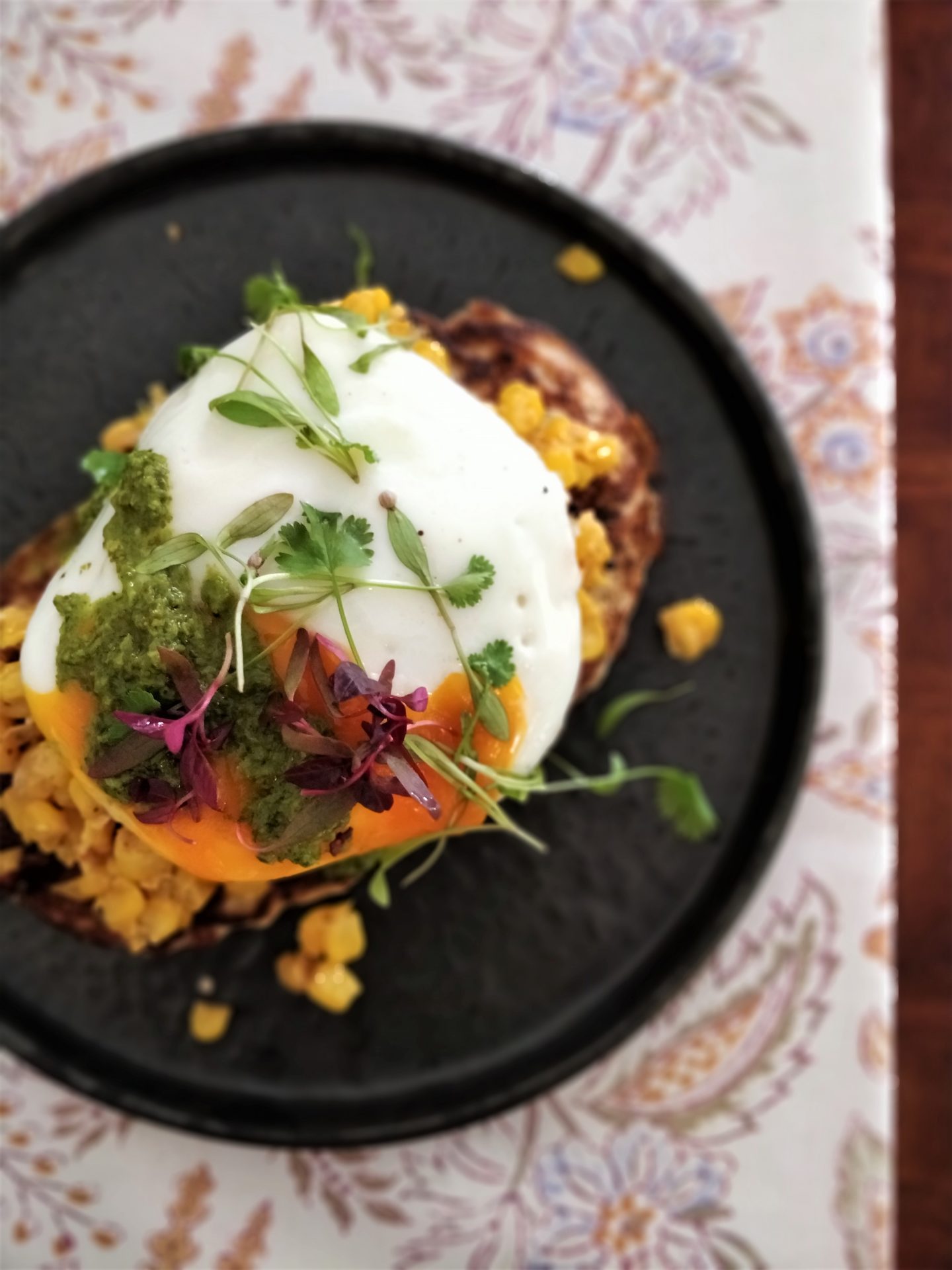
Sweetcorn Pancakes 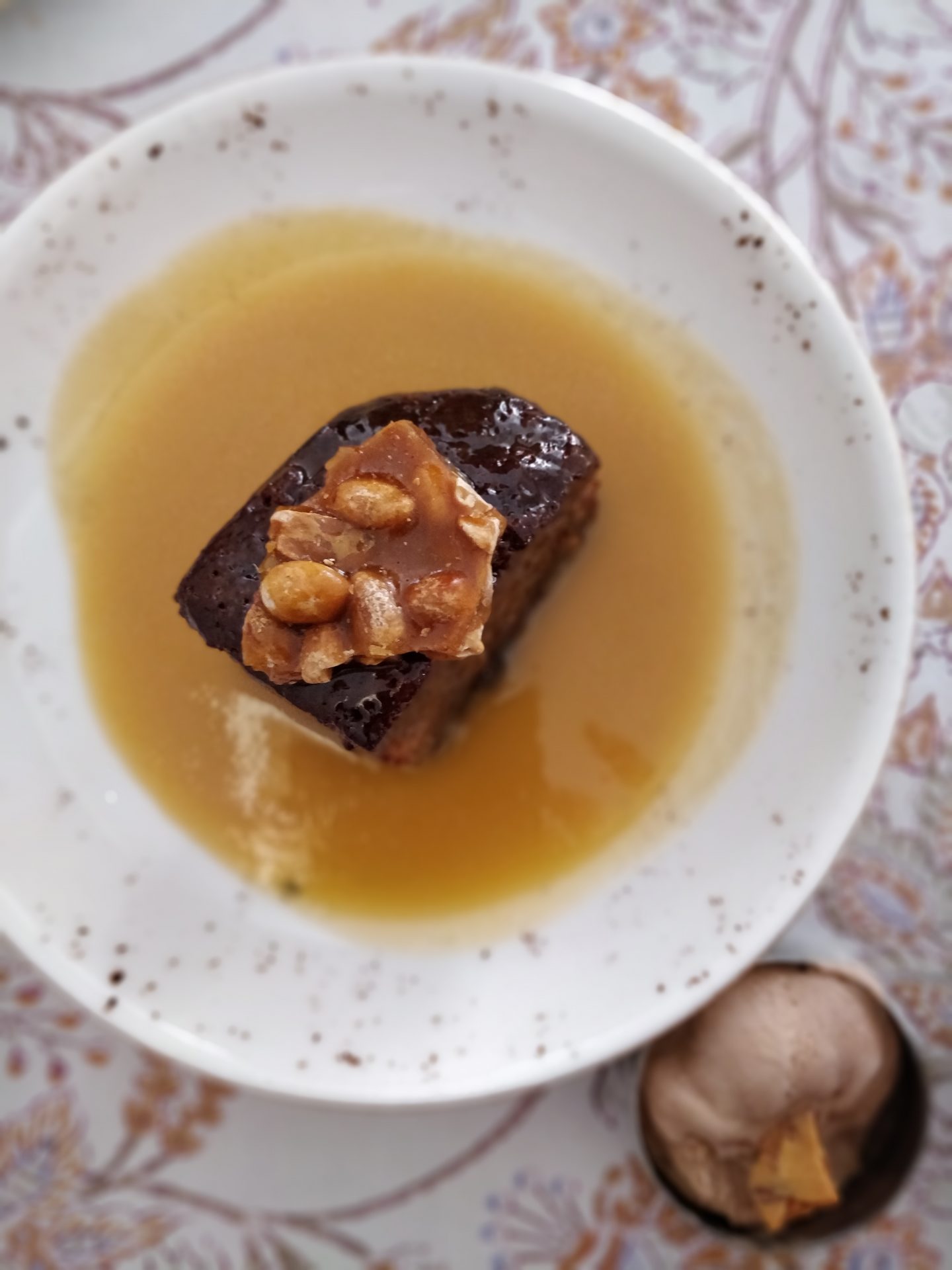
Banana Cake
What item which is widely considered a luxury is one that you could not live without?
Time is the biggest luxury in the age that we live in. No-one has time, and to be able to give your time to someone, whether you’re mentoring them, being compassionate to yourself or spending it with your partner and colleagues, I think that’s a luxury and I couldn’t live without that. The best gift that you can give to someone is your time.
What has been your hardest life lesson to date and how did you overcome it?
Opening the restaurant has been the hardest thing I’ve ever done: learning to balance a kitchen, front of house, your values, your message, plus the finances. It’s an extreme juggling act.
My biggest life lesson is the ability to let go. We have such egos and hold onto things then we grapple with them, so letting go and coming to terms with the fact that something may no longer be part of your life, whether that’s a friend, a family member, a business or a colleague, and finding peace in that is liberating. You accept what the universe is trying to teach you because there’s always a lesson in loss as well. Having a sense of purpose in life is very important. It’s something we should be asking our children a lot more because without it, they won’t find happiness.
“My biggest life lesson is the ability to let go.”
I keep my grandfather’s photo near the entrance at Jikoni. He was a very simple man who only ever wanted to give. At his funeral, people said that he’d helped them, he’d heard them, he’d resolved an issue they had, and for me, that’s a life well lived. There are amazing people doing that day in, day out, in our industry.
One of the wonderful things about my life is that I do have the opportunity to have an impact, whether that’s by feeding people, for charity or training my team. It’s so rewarding to get someone at sapling stage and seeing that seed grow. We had a guy who was like Manuel from Fawlty Towers, but over time, I watched him develop confidence. One day, I was a chef down due to sickness and he said, “I can help you, Ravinder!” Although he wasn’t a chef, he’d been watching all the processes from the pass and when I put him on a section, he knocked it out of the park. I was flabbergasted!
If you were do to a ‘stage’ now, which restaurant would you choose and what draws you to it?
Any kind of maternal kitchen would be perfect. I love Italian food, so somewhere like The River Café where I can make pasta by hand; I love using my hands. Their ingredients are so beautiful as well; imagine opening that fridge or larder and finding the best cheeses, eggs and flours.
I am also fascinated by Doug McMaster at Silo and his zero waste ethos – I would love to learn from him.
It’s amazing to work with female chefs as well. I recently met Martha Ortiz [of Ella Canta] and I found to be utterly beguiling. Her story of the struggles she has faced as a woman in this industry is incredible and so inspiring. I have a lot to learn from these people.
Are you still in touch with your former colleague who suggested that you enter The F-Word and how did you respond to her saying that she had a strong feeling from the outset that you’d win?
Yes, Heather and I are still in touch! She’s a wonderful woman, but I haven’t seen her for a long time because her husband is a diplomat, so they’ve been living in Russia and Columbia and have just come back. She really had this ability to be slightly psychic, so there was no messing with her. She said, “I have such a strong instinct that if you enter this thing, you’re going to win.” It was so random: I was a beauty journalist and wasn’t even consciously thinking about it. But I did it and I’ll always be immensely grateful to her for changing my life.
If you enjoyed this Ravinder Bhogal interview, you can read more from my Spotlight on Chefs series here. This interview has been edited for length, and all photos are my own unless otherwise stated.
LINKS: Jikoni, Ravinder Bhogal on Instagram, My Top 10 Meals of 2019 (including The River Cafe), Asma Khan Interview, Nokx Majozi Interview
PIN FOR LATER


Such a fascinating interview, Seetal. Such a sense that Ravinder cooks from the heart, and how Jikoni is an extension of her love of cooking for family and friends. Also helps that she’s a brilliant chef too! Completely agree that food is also more than just what’s on a plate – here it’s a reflection of diversity and immigration, things we really need to be championing and celebrating in this day and age..
Really glad you enjoyed the interview, Aaron, and you’re completely right about food representing more than the meal itself. I’m a big fan of Jikoni, and it was a pleasure spending time with Ravinder as well!
Great interview, what a great journey Ravinder has been on
Thanks, Laura – she’s such a fighter.